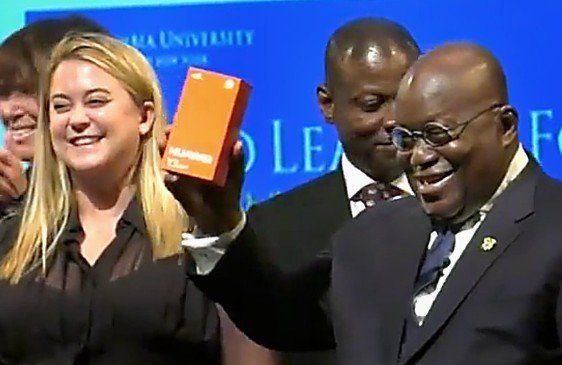Ghana Health Services, with support from the One Million Community Health Workers Initiative, or 1mCHW, has deployed 20,000 CHWs and 1,000 eHealth technicians. Although the Ghanaian government can finance stipends for the health workers, they’re unable to gather the funds to equip each worker with a smartphone—and that’s where Blue Chip Foundation came in.
Blue Chip Foundation provided thousands of Android smartphones for Millennium Promise to program and distribute. The organization’s $350,000 donation will serve as a model for partnerships in other African countries to emulate, and it represents a significant step toward Blue Chip’s goal of alleviating global poverty in accord with the United Nations’ Sustainable Development Goals, or SDGs.
“Community health workers are trained in basic healthcare, and they can assist in emergencies,” says Gross. “Even more importantly, they can play a big role in preventing emergencies from occurring in the first place by providing necessary preventive care. The phones are part of the entire program’s infrastructure, and they’re absolutely essential—particularly because about 45 percent of Ghanaian citizens live in rural communities located miles from health clinics. Transportation can be difficult, and many people don’t even have access to that; even what some would consider mild to moderate injuries or illnesses can become life-threatening under those conditions.”
President Akufo-Addo thanked Gross, Dr. Sonia Sachs, and the Millennium Promise Alliance (represented at the conference by Chief Nat Ebo Nsarko) for showcasing Ghana’s needs—and its remarkable progress—on the global stage. Akufo-Addo also said that the phones will help save lives in rural communities across Ghana, where previous presidents have also strived to provide adequate healthcare.
“This generous donation made by Jenn Gross
and her husband Peter Stengaard is jump-starting a historic program in Ghana making it the first country in sub-Saharan Africa that will deploy mobile phones in rural communities, supporting universal health coverage,” says Sonia Ehrlich Sachs, Director of the Health Sector at the Center for Sustainable Development at Columbia University.
Held in Hensen Studios’ Studio A, where “We Are the World” was recorded in 1985, Safari Nights was also hosted by Hayden Bixby, Amy Eldon Turtletaub, Faryal Ganjehei and Lucy Woodward.
Donations for the Cura Orphanage, which supports approximately 50 children who have lost their parents to AIDS, go toward ensuring the children living there are able to continue their educational journeys and obtain vocational training as they transition into adults.
Children living at Cura Orphanage range in age from 4 to 13. The orphanage’s mission is to provide a loving, caring home for the kids, who attend local preschools and primary schools.
“In 2013, I realized there were kids that were a couple of years from graduating, so we donated $40,000 to Cura Orphanage to provide scholarships for higher education, should any of them want to pursue that path. Realizing that only 2 percent of Kenyans go to university, we broadened the use of the funds to include vocational training,” says Gross.
As hostess, Gross compiled a poignant collection of photos to share the everyday lives of Cura’s children with attendees. The pictures illustrated where donors’ financial gifts would have the most impact, as well.
Bixby provided an update on the children who benefited from Safari Nights. “Last year’s Safari Nights made it possible for all five of Cura’s 2016 graduates to pursue their dreams after high school. Carol is studying fashion design in Nairobi. She has a full scholarship, so we’ll cover all of her materials and incidental expenses for the two years of her program,” said Bixby. “Samuel has already finished the first step to becoming a commercial truck driver. He got his driver’s license last month and will start the government certification program in February.”
She also noted that the three remaining graduates were pursuing vocational training as well.
“Sarah has completed the first term of her hospitality course, getting ready to work in the hotel industry,” said Bixby. “Stephen is doing a certificate in electrical engineering at Maasai Technical Training Institute. We are proud to be able to cover his full tuition, room, and board. Kelvin decided to pursue hairdressing and beauty. He attends college and lives at our partner institution nearby – John Kaheni Residence. He studies drawing on the side.”
Guests enjoyed a miniature African bazaar featuring tables of African clothing and jewelry for sale, as well as musical performances by Lucy Woodward, Nikka Costa, and legendary recording artist Sting’s son, Joe Sumner.
“The crowd was a mix of people who are already familiar with and supporting Cura and some folks who were just learning about it,” says Gross. I invited a good friend of mine, Braden Kulhman who travelled with Julian Lennon and I to Africa. It was her first exposure to Cura. Afterward, we were able to ask for a grant from Julian and his White Feather Foundation, and he ended up giving $15,000. Braden is a beautiful free spirit, and after that she wanted to go and spend time with the kids herself at Cura. Julian’s donation was very heartfelt.”
“Beyond the financial success of the event, I enjoyed some personal success in getting to share Cura and Safari Nights with my husband and co-Founder of Blue Chip Foundation, Peter Stengaard. He considers all the children we help in Africa as our own,” says Gross.

